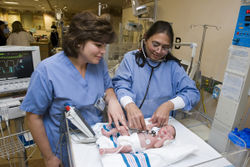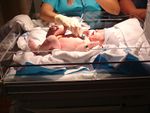Neonatal nursing
Neonatal nursing is a subspecialty of nursing that works with newborn infants born with a variety of problems ranging from prematurity, birth defects, infection, cardiac malformations, and surgical problems. Some Neonatal nurses work with newborns up to two year olds. Requirements for neonatal nurses are established by the institution which uses a list of practice skills to assess nurses’ abilities in many different things. [1] A Neonatal nurse works in many different levels such as one, two, and three. one being the least demanding two being much more demanding and three being the most demanding. Approximately 40,000 low-birth-weight infants are born annually in the United States. Because of this we need Neonatal nurses. The salary depends on the cost of living in your area.
Description and Salary
A Neonatal nurse is a special type of nurse that works with new born babies with a variety of problems. some of these problems can range from prematurity, birth defects, infection, cardiac malformations, and surgical problems. The neonatal period is the first month of life. However, these newborns are often sick for months.[2] You will work closely with parents, neonatologists and other nurse specialists to achieve optimal results for your tiny patients. They make about RN: $66,640, NNP: $102,670. Generally your salary would depend on the cost of living in you area. The beginning range for someone with no experience would be about $30,00. For someone with no experience, but has been working longer would make about $48,000.
Education and Certification
To become a Neonatal nurse you must first be a registered nurse with a Bachelor of Science in Nursing and you must be certified by your State Board of Nursing or receive a national certification from an agency such as the National Certification Corporation. National Association of Neonatal Nurses (NANN) reports that many diploma programs are being phased out, and bachelor’s degrees offer the greatest potential for quickly finding a job and having career mobility. This level of education also allows students to pursue a graduate degree, a necessary step in being qualified for advanced positions. An associate degree can be obtained in 2–3 years at a junior or community college. A diploma degree can be obtained through a hospital-based school of nursing. However, diploma programs are being phased out in most areas of the country. The baccalaureate degree (BSN), which provides the most career flexibility, is earned through a college or university and generally takes four years to obtain. If you have a degree in another field, you may be eligible for a faster program where you can obtain a bachelor of science in nursing (BSN) or master of science in nursing (MSN) in 1-2 years.[3]
Three Levels of Neonatal nursing
A neonatal nurse works in either a level one, two, or three nursery. In level I, you would care for the more healthy infants. People are not seeing much of the nurses in this level because mothers and newborns are now more likely to stay together in the same room after birth. Also largely nonexistent now because mothers and babies have a very short hospital stay these days. Level II nurses are much more in demand because premature and sick babies need constant attention. These babies are sick but in level three sometimes they are in critical condition. Level III nurses have the most in-depth responsibilities, working in the Neonatal intensive care unit (NICU) and monitoring seriously ill or premature infants around the clock. They check ventilators and incubators, make sure babies are responding well, and teach parents how to care for their infants properly. The babies in this level may be small for their age, premature, or sick term infants. [1]
Video
What is a neonatal nurse?
References
- ↑ 1.0 1.1 Neonatal Nurse Nurses for a Healthier Tomorrow. Web. Last accessed March 24, 2017. Author Unknown
- ↑ Is a career in Neonatal nursing right for you? National association of neonatal nurses'. Web. march 11, 2017. Author Unknown
- ↑ IHow to Become a Neonatal Nurse Practitioner National Association of Neonatal Nurses. Web. last accessed March 22, 2017. Author Unknown
| ||||||||||||||||||||



